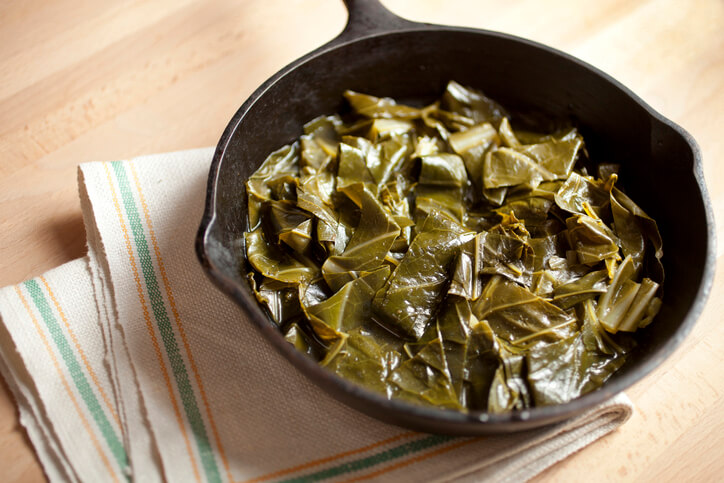Learn About Collard Greens - The Veggie Fuzzy Zoeller Told Tiger Woods Not to Serve
6 years ago | Nutrition
By Joy Stephenson-Laws, JD, Founder
Back in 1997 when Tiger Woods was just 21-years-old, he won the Masters Tournament. It was a big deal! Woods was the youngest player ever to win the Masters. He also made history as the first African-American to win this major golf tournament.
At the time, fellow golfer Fuzzy Zoeller had some choice words for Woods’ win. To make a long story short, the winner of the Masters gets to select the menu for the Champions Dinner hosted the following year after the tournament. In this video, you can see Zoeller telling a group of reporters to tell Woods “not to serve fried chicken...or collard greens or whatever the hell they serve.”
Zoeller was obviously criticized for his remarks. To this day, I associate his name with those remarks. Fried chicken and collard greens are two popular African American or Southern Diet dishes, and the remarks were seen as offensive to some.
In many instances, a diet with excessive fried foods is usually unhealthy and may be contributing to alarmingly high rates of hypertension in the black community. But collard greens, one of the food items Zoeller said Woods should not serve, are leafy greens with a tremendous amount of health benefits.
Collard greens are part of the cruciferous vegetable family along with kale, broccoli, arugula, Brussels sprouts, cauliflower, cabbage and more. In their raw, natural form, collards resemble a cross between kale and swiss chard (another cruciferous veggie).
Cruciferous vegetables are the veggies that contain glucosinolates, sulfur containing compounds that may help fight a variety of cancers.
Other potential health benefits of collard greens?
- Collard greens may help combat glaucoma.
Glaucoma is a disease that damages your eye’s optic nerve. A study from 2016, published in the Journal of the American Medical Association (JAMA), found evidence suggesting that people who consumed nitrate containing vegetables, such as collard greens, had a lower risk of developing glaucoma. Just one serving or more per month of kale or collard greens was “significantly associated” with 55-70 percent reduced odds of developing primary open-angle glaucoma (POAG).
- Collard greens may help lower your cholesterol.
Especially when steam cooked, collard greens have a strong bile acid binding capacity which has been connected to lowering cholesterol.
“Bile acid binding capacity has been related to the cholesterol-lowering potential of foods and food fractions. Lowered recirculation of bile acids results in utilization of cholesterol to synthesize bile acid and reduced fat absorption. Secondary bile acids have been associated with increased risk of cancer. Bile acid binding potential has been related to lowering the risk of heart disease and that of cancer,” reports the National Institutes of Health (NIH).
Collard greens are also cholesterol-free and are a great source of both soluble and insoluble fiber, which may also help lower your cholesterol.
- Collard greens may be great for your bones.
Collards are very rich in vitamin K. In fact, just half a cup of cooked collard greens provides more than 300 percent of the general daily value (DV) of vitamin K. This vitamin is known for its importance in blood clotting, but it also plays a role in bone metabolism and may provide protection against osteoporosis and decrease the risk of fractures.
These leafy greens are also said to be one of the highest plant-based sources of calcium. One cup of cooked collard greens has a quarter of the amount of calcium that most people need in a day. And as you likely already know, calcium is very important for building and maintaining strong, healthy bones.
- Collard greens may help lower blood sugar levels.
This vegetable contains an antioxidant called alpha-lipoic acid. This antioxidant may lower glucose levels and more.
“Scientists have found that it can be used medically to help regenerate liver tissue, reverse the complications of diabetes mellitus, slow or stop the growth of cancer cells, and chelate heavy metals, among other actions,” reports the National Institutes of Health (NIH).
- Collard greens may make your skin healthy.
These greens are rich in lutein. This antioxidant is known for being beneficial to eye health, “But there is mounting evidence that the nutrient decreases the risk of wrinkles, as well as cancer. Dark leafy greens [such as collard greens] are the richest sources of lutein…,” according to one source.
Collard greens are also rich in other essential vitamins and minerals we all need to stay healthy, including phosphorus, magnesium, potassium, vitamin A, folate and more.
How to Prepare Collard Greens
In the Southern Diet, collard greens may be prepared with ham hocks or smoked turkey wings. Perhaps a more healthy way to prepare collard greens is to just simply saute or steam them for a healthy side dish. Check out this easy, healthy recipe.
Precautions with Collard Greens?
“Despite their high level of nutrients, collard greens aren’t for everybody. Certified nutritional consultant Phyllis A. Balch, author of ‘Prescription for Dietary Wellness,’ says people with a history of kidney stones should minimize their consumption of collards and other oxalate-containing cruciferous vegetables. Oxalate can contribute to the formation of kidney stones, says Balch,” according to one source.
In addition to this, people who take blood thinner medications (such as Warfarin) need to be mindful of consuming vitamin K rich foods such as collard greens.
Always consult a competent healthcare professional about what foods you are including in your daily diet if you take medications, have any existing health issues or are pregnant or breastfeeding.
Enjoy your healthy life!
The pH professional health care team includes recognized experts from a variety of healthcare and related disciplines, including physicians, attorneys, nutritionists, nurses and certified fitness instructors. This team also includes the members of the pH Medical Advisory Board, which constantly monitors all pH programs, products and services. To learn more about the pH Medical Advisory Board, click here.







